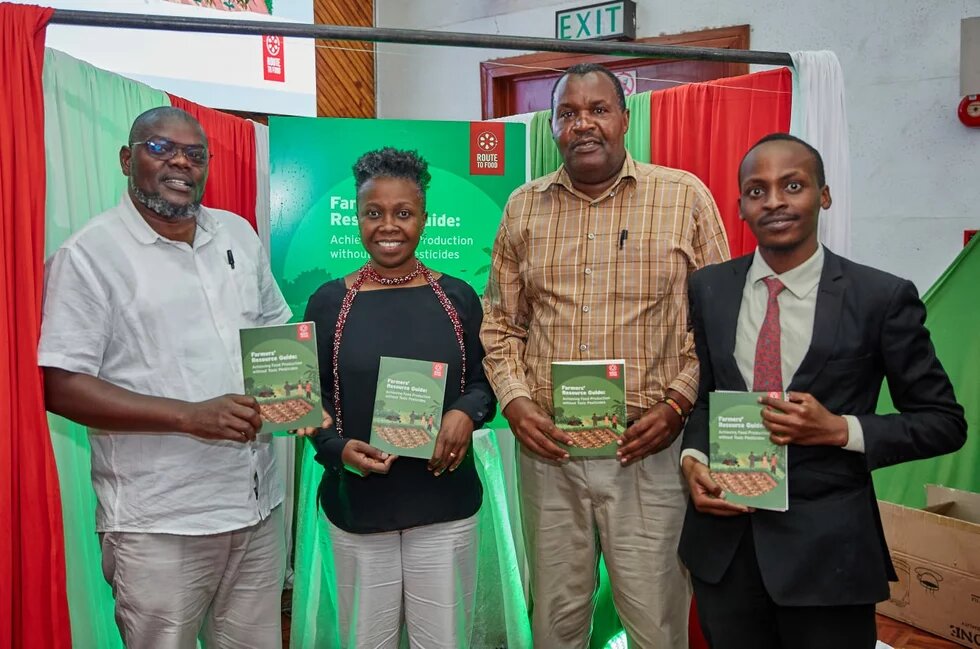Nairobi, Kenya, December 9, 2024 - The Route to Food Initiative (RTFI), a programme of the Heinrich Böll Foundation, Kenya, is excited to announce the launch of Kenya’s first-ever Farmers Resource Guide on alternatives to Highly Hazarders Pesticides (HHPs), a groundbreaking tool designed to promote sustainable and pesticide-free farming practices. This guide is by framers for farmers, offering practical knowledge and tools to help farmers at all experience levels to grow healthy, nutritious food while safeguarding their health, the environment and future generations.

Nairobi, Kenya, December 9, 2024 - The Route to Food Initiative (RTFI), a programme of the Heinrich Böll Foundation, Kenya, is excited to announce the launch of Kenya’s first-ever Farmers Resource Guide on alternatives to Highly Hazardous Pesticides (HHPs), a groundbreaking tool designed to promote sustainable and pesticide-free farming practices. This guide is by framers for farmers, offering practical knowledge and tools to help farmers at all experience levels to grow healthy, nutritious food while safeguarding their health, the environment, and future generations.
The guide, titled Farmers Resource Guide: Achieving Food Production without Toxic Pesticides, provides clear, actionable instructions on adopting agroecological principles, improving soil health, and controlling pests and diseases without relying on harmful chemicals. It builds on the findings of the 2023 Heinrich Böll Foundation report, Toxic Business: Highly Hazardous Pesticides (HHPs) in Kenya, which revealed that 76% of pesticides used on Kenyan farms are highly hazardous, posing severe risks to human health and the environment.
Joachim Paul, Director of the Heinrich Böll Foundation in Nairobi, emphasized the importance of transitioning to safer farming practices, stating, “Food production systems that rely heavily on pesticides harm the environment and pose serious health risks to farmers, their families, and consumers. This guide serves as a beacon of hope, proving that it is possible and practical to grow food without relying on highly hazardous pesticides—disproving the long-standing narrative that farming without pesticides is unattainable.”
The guide includes easy-to-follow strategies for preventing pests and diseases from becoming a problem by building healthy soils, leveraging biodiversity to naturally deter pests, and creating eco-friendly pest control solutions using natural resources. It also provides crop-specific approaches for staple crops like maize and vegetables like tomatoes, cabbages, and leafy greens, alongside cultural practices such as crop rotation, mulching, and intercropping to enrich soils and build resilience.
The decision by the Pest Control Products Board (PCPB) to ban certain active ingredients by the end of 2024 is supported by many famers, consumers, and NGOs. This manual shows that it is possible. Dr. Harun Warui, Lead Programme Coordinator for Food Rights and Agroecology at the Heinrich Böll Foundation, supports this move, stating, “Many Kenyan farmers we have worked with welcome this decision, PCPB. Alternatives have always existed, and this Farmers Resource Guide proves that safe and sustainable farming is achievable.
Co-author and lead scientist of the resource guide, Dr. Silke Bollmohr, supported this statement, saying, “I support the decisions by the PCPB to ban certain pesticides in Kenya, which have also been banned in countries of their origin. This manual shows that it is possible farmers, especially in Kenya, don’t need harmful pesticides. PCPB is on the right track.
For many years, farmers have been made to believe that growing food without pesticides is a mirage. This notion is a myth perpetuated by agrochemical companies and some media outlets to promote pesticide use in the country. Integrated Pest Management (IPM) and agroecological approaches, such as crop rotation, organic farming, and more, have been proven effective alternatives, providing long-term benefits for both yields and environmental health. These approaches emphasize the potential for Kenyan farmers to succeed without relying on harmful pesticides by adopting informed, eco-friendly farming methods.
“The notion that withdrawing these active ingredients will cause a food production crisis is misleading,” says Sylvia Kuria, an organic farmer from Ndeiya. As an organic farmer for years, I know it’s possible to grow food without toxic pesticides and how effective it is. I am very happy to share my experiences in this farmers guide as one of the authors.”
In addition to supporting farmers, the guide seeks to influence policymakers and agricultural stakeholders by advocating for safer and more sustainable farming practices. The Route to Food Initiative calls on the Kenyan government, agrochemical companies, and civil society organizations to work together to create a resilient and sustainable food system that prioritizes the health of farmers, consumers, and the environment.
ENDS/
This press release was circulated and published in the Kenyan media.